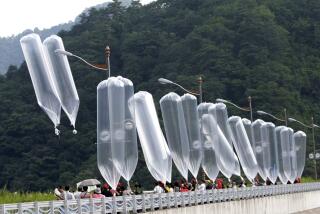U.S. Moving to Ready Public for Korea Tensions
- Share via
WASHINGTON — The Clinton Administration, concerned that its diplomatic effort with regard to North Korea is producing meager results, is moving to prepare the public for rising tensions in the area, including the possibility of military conflict.
Defense Secretary William J. Perry said Monday that he will make a major speech today outlining the situation in Korea in an attempt to lay the political groundwork for possible intensification of the year-old confrontation between the two sides over Pyongyang’s nuclear capability.
Although Perry is expected to call for continued diplomacy--rather than immediate U.S. military action--to persuade North Korea to accept international inspection of its nuclear facilities, he said tensions could escalate quickly and that he wants to ensure that Americans are aware of “what the national security issues are.”
He cautioned that the United States could face military conflict if the allies ultimately decide to seek U.N. economic sanctions against North Korea, whose leaders have warned that they would regard any such step as an “act of war.”
“We might have to go to sanctions, and sanctions do increase the risk of a military confrontation,” he said in a breakfast session with reporters and editors of the Washington Bureau of The Times.
Perry’s remarks came as officials disclosed that the United States has given North Korea a new series of proposals for resuming broader diplomatic negotiations between Washington and Pyongyang--talks that North Korea has said it wants as part of a longer-term settlement.
Although details of the new American plan were not immediately available, policy-makers said the document contains suggestions on the timing and conditions for such talks. Officials said North Korea had not yet replied and it was not immediately clear just how it might react.
Perry’s attempt to prepare the public for the grim possibilities in Korea apparently is part of a broader effort by the Administration to rally public support for its key foreign policy positions at a time when U.S. interests are not as clear as they were in Cold War days.
“The two really big national security problems we face today are with Russia and with Korea,” he said, but “the public and Congress are not quite as aware of (them) because they’re not on the front page.”
“And yet, if they become a crisis,” Perry said, “then we go almost overnight from an issue which the public hasn’t been following to an issue affecting, in a major way, our national security.”
For the first time, Perry also suggested that sanctions could have a significant effect, even if China does not agree to go along with them. Until now, officials have generally said that Washington would need China’s cooperation to make any sanctions work.
He said that, largely because of North Korea’s increasingly strident rhetoric, South Koreans appear to have “strengthened their resolve” to step up pressure on Pyongyang to comply with international inspection requirements.
Washington is taking a two-track approach in seeking to resolve its dispute with North Korea. On the one hand, it is pressing for a diplomatic solution, offering promises of substantial economic aid if North Korea accepts inspections and shelves its nuclear weapons program.
At the same time, Perry has begun bolstering American and South Korean military forces in case North Korea should launch an attack. The Pentagon recently sent Patriot air-defense missiles to South Korea and is replacing aging helicopters there and stockpiling more aircraft parts.
Perry visited Seoul two weeks ago to confer with South Korean leaders and U.S. military commanders in the region. At the same time, he took a relatively conciliatory approach, declaring he saw no threat of “imminent” military action.
But in the days since, the situation has deteriorated and U.S. officials seem more pessimistic, with predictions in some quarters that the allies will end up having to push for imposition of sanctions after all.
Last week, North Korea rejected demands that inspectors be allowed to test the spent fuel rods scheduled to be removed this month from its reactor at Yongbyon.
Perry has estimated that the spent fuel to be taken from the reactor could be turned into enough weapons-grade plutonium for North Korea to manufacture between four and five nuclear bombs.
Perry said that one turning point could come as early as mid-May, when the International Atomic Energy Agency, which oversees such inspections, declares formally whether Pyongyang is complying with demands to allow inspectors access to the spent fuel rods.
Times staff writer Jim Mann contributed to this report.
* NORTH KOREAN DEFECTOR: Ex-security officer tells of widespread hunger. A6
More to Read
Sign up for Essential California
The most important California stories and recommendations in your inbox every morning.
You may occasionally receive promotional content from the Los Angeles Times.













